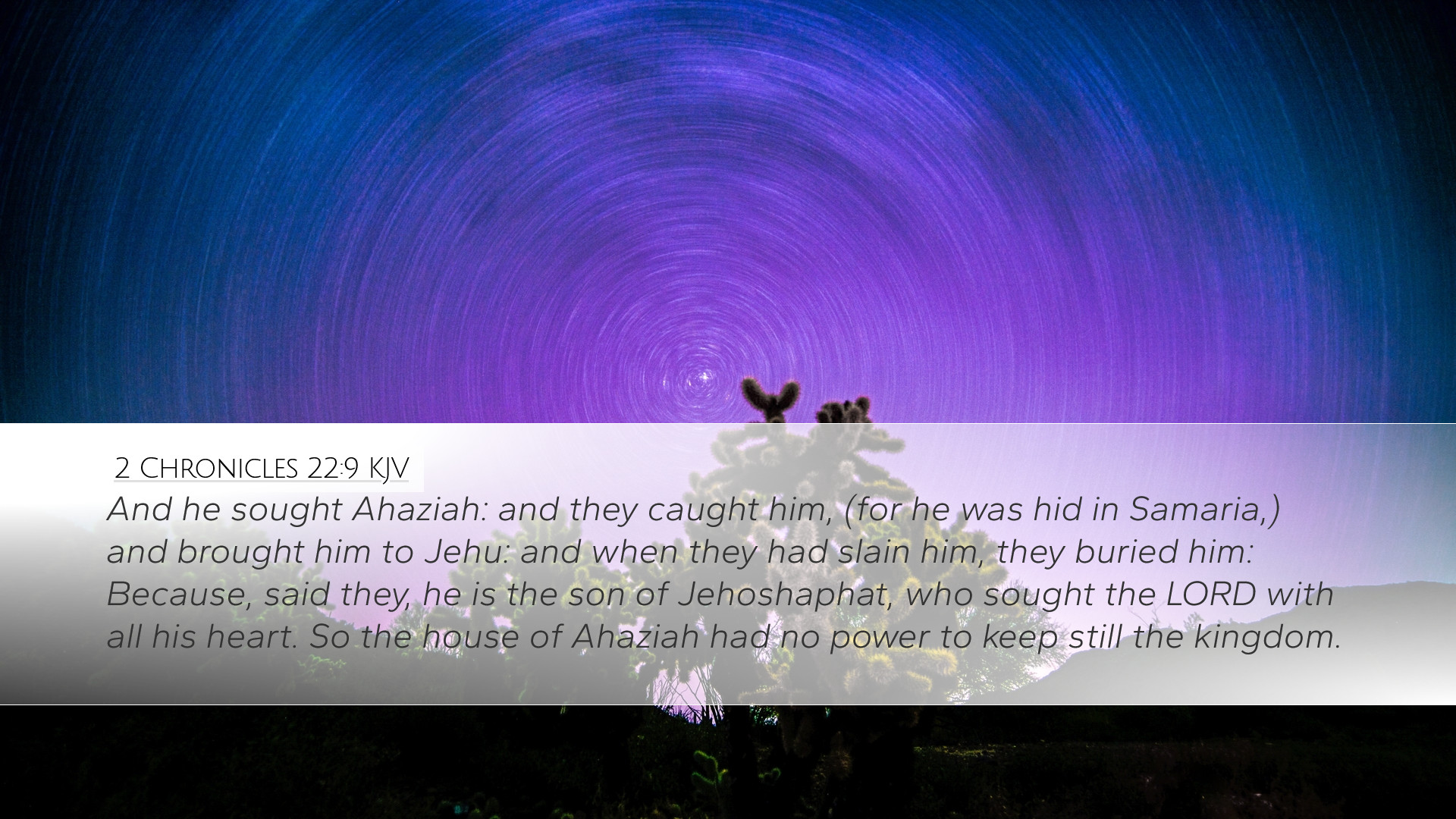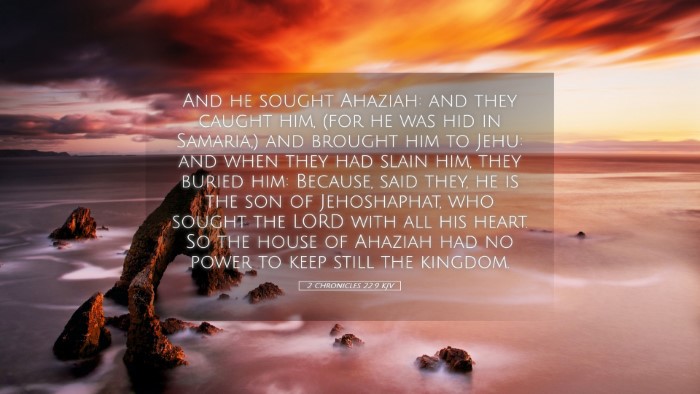Commentary on 2 Chronicles 22:9
Verse: "And he sought Ahaziah: and they caught him, for he was hid in Samaria, and brought him to Jehu: and when they had slain him, they buried him: because, said they, he is the son of Jehoshaphat, who sought the LORD with all his heart. So the house of Ahaziah had no power to keep still the kingdom."
Introduction
In this profound and somewhat tragic narrative, we witness the culmination of God’s judgment against the house of Ahab through Jehu’s military campaign. The verse encapsulates key themes of divine sovereignty, judgment, and the legacy of faith as epitomized by Jehoshaphat. The combined insights from renowned public domain commentaries offer depth into its implications for believers today.
Context Overview
2 Chronicles 22 chronicles the reign of Ahaziah, king of Judah, who was influenced by his mother Athaliah and the wicked counsel of the house of Ahab. His brief reign was marked by idolatry and a failure to honor God, which led to his demise at the hands of Jehu. This historical backdrop provides crucial understanding for interpreting the significance of the events described in this verse.
Historical Context
The history of Judah during Ahaziah's reign is fraught with trouble, stemming from alliances with Israel and idolatrous practices. As noted by Albert Barnes, the political situation was dire, influenced heavily by the consolidation of power by the house of Ahab through the marriage alliances that joined them with the royal family of Judah.
Thematic Analysis
1. Divine Judgment
The capture of Ahaziah reflects God’s judgment on his disobedience. Matthew Henry emphasizes that God's judgments are sure and inevitable for those who turn away from Him. Ahaziah's alliance with wickedness ultimately led to his downfall, while Jehu’s anointing was ordained for the purpose of divine retribution against the house of Ahab.
2. Seeking and Hiding
The act of seeking Ahaziah indicates the pursuit of judgment. Adam Clarke notes that Ahaziah had attempted to hide in Samaria, a move indicative of his moral and spiritual failures. His hiding speaks to the futility of evading divine judgment; just as one cannot hide from the all-seeing eye of God, so too does Ahaziah learn that righteousness cannot be avoided, even in isolation.
3. Legacy of Jehoshaphat
The verse underscores a crucial theological insight; even in the face of judgment, God remembers those who have sought Him in sincerity. The mention of Jehoshaphat, known for his commitment to God, serves as a stark contrast to Ahaziah. As Barnes elucidates, this legacy of faith is foundational for understanding the broader implications of God’s justice. While Ahaziah fell, Jehoshaphat’s faithfulness preserved a lineage of righteousness, thus impacting God's redemptive narrative.
4. God's Sovereignty
Jehu's emergence as a ruler bringing about this judgment illustrates the sovereignty of God in using human instruments to fulfill divine purposes. The plan of God overrides human schemes, and the swift execution of judgment against Ahaziah aligns with the prophetic declarations made previously. This truth assures believers that God is always in control, regardless of the appearances of chaos around them.
Practical Applications
- Facing Judgment: Understand that there are consequences for our actions both individually and collectively. Reflect on how one's life aligns with the teachings of scripture.
- Value of Legacy: Consider the impact of legacy in our families and communities. Strive to live a life that honors God, akin to Jehoshaphat, ensuring that future generations can inherit a foundation of faith.
- Trusting God's Sovereignty: In times of uncertainty, remember that just as God was sovereign in the events that led to Jehu’s rise, He is sovereign today. Trust His plans, knowing He works all things for the good of those who love Him.
- The Importance of Seeking God: Take active steps in pursuing a deeper relationship with God, recognizing that seeking Him fosters spiritual growth and empowers one to stand firm against adversity.
Conclusion
2 Chronicles 22:9 paints a vivid picture of the contrast between the houses of faith and disobedience. With insights drawn from the commentaries of Henry, Barnes, and Clarke, we uncover layers of meaning that enrich our understanding of divine judgment, the importance of legacy, and the sovereignty of God. As we reflect on this verse, may we be encouraged to pursue God wholeheartedly, avoiding the pitfalls that led to Ahaziah's downfall, and committing ourselves to a legacy that glorifies God.


